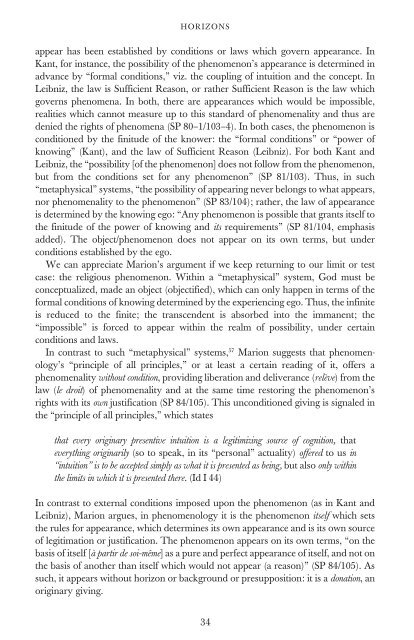Speech and Theology: Language and the Logic of Incarnation
Speech and Theology: Language and the Logic of Incarnation
Speech and Theology: Language and the Logic of Incarnation
You also want an ePaper? Increase the reach of your titles
YUMPU automatically turns print PDFs into web optimized ePapers that Google loves.
HORIZONS<br />
appear has been established by conditions or laws which govern appearance. In<br />
Kant, for instance, <strong>the</strong> possibility <strong>of</strong> <strong>the</strong> phenomenon’s appearance is determined in<br />
advance by “formal conditions,” viz. <strong>the</strong> coupling <strong>of</strong> intuition <strong>and</strong> <strong>the</strong> concept. In<br />
Leibniz, <strong>the</strong> law is Sufficient Reason, or ra<strong>the</strong>r Sufficient Reason is <strong>the</strong> law which<br />
governs phenomena. In both, <strong>the</strong>re are appearances which would be impossible,<br />
realities which cannot measure up to this st<strong>and</strong>ard <strong>of</strong> phenomenality <strong>and</strong> thus are<br />
denied <strong>the</strong> rights <strong>of</strong> phenomena (SP 80–1/103–4). In both cases, <strong>the</strong> phenomenon is<br />
conditioned by <strong>the</strong> finitude <strong>of</strong> <strong>the</strong> knower: <strong>the</strong> “formal conditions” or “power <strong>of</strong><br />
knowing” (Kant), <strong>and</strong> <strong>the</strong> law <strong>of</strong> Sufficient Reason (Leibniz). For both Kant <strong>and</strong><br />
Leibniz, <strong>the</strong> “possibility [<strong>of</strong> <strong>the</strong> phenomenon] does not follow from <strong>the</strong> phenomenon,<br />
but from <strong>the</strong> conditions set for any phenomenon” (SP 81/103). Thus, in such<br />
“metaphysical” systems, “<strong>the</strong> possibility <strong>of</strong> appearing never belongs to what appears,<br />
nor phenomenality to <strong>the</strong> phenomenon” (SP 83/104); ra<strong>the</strong>r, <strong>the</strong> law <strong>of</strong> appearance<br />
is determined by <strong>the</strong> knowing ego: “Any phenomenon is possible that grants itself to<br />
<strong>the</strong> finitude <strong>of</strong> <strong>the</strong> power <strong>of</strong> knowing <strong>and</strong> its requirements” (SP 81/104, emphasis<br />
added). The object/phenomenon does not appear on its own terms, but under<br />
conditions established by <strong>the</strong> ego.<br />
We can appreciate Marion’s argument if we keep returning to our limit or test<br />
case: <strong>the</strong> religious phenomenon. Within a “metaphysical” system, God must be<br />
conceptualized, made an object (objectified), which can only happen in terms <strong>of</strong> <strong>the</strong><br />
formal conditions <strong>of</strong> knowing determined by <strong>the</strong> experiencing ego. Thus, <strong>the</strong> infinite<br />
is reduced to <strong>the</strong> finite; <strong>the</strong> transcendent is absorbed into <strong>the</strong> immanent; <strong>the</strong><br />
“impossible” is forced to appear within <strong>the</strong> realm <strong>of</strong> possibility, under certain<br />
conditions <strong>and</strong> laws.<br />
In contrast to such “metaphysical” systems, 57 Marion suggests that phenomenology’s<br />
“principle <strong>of</strong> all principles,” or at least a certain reading <strong>of</strong> it, <strong>of</strong>fers a<br />
phenomenality without condition, providing liberation <strong>and</strong> deliverance (relève) from <strong>the</strong><br />
law (le droit) <strong>of</strong> phenomenality <strong>and</strong> at <strong>the</strong> same time restoring <strong>the</strong> phenomenon’s<br />
rights with its own justification (SP 84/105). This unconditioned giving is signaled in<br />
<strong>the</strong> “principle <strong>of</strong> all principles,” which states<br />
that every originary presentive intuition is a legitimizing source <strong>of</strong> cognition, that<br />
everything originarily (so to speak, in its “personal” actuality) <strong>of</strong>fered to us in<br />
“intuition” is to be accepted simply as what it is presented as being, but also only within<br />
<strong>the</strong> limits in which it is presented <strong>the</strong>re. (Id I 44)<br />
In contrast to external conditions imposed upon <strong>the</strong> phenomenon (as in Kant <strong>and</strong><br />
Leibniz), Marion argues, in phenomenology it is <strong>the</strong> phenomenon itself which sets<br />
<strong>the</strong> rules for appearance, which determines its own appearance <strong>and</strong> is its own source<br />
<strong>of</strong> legitimation or justification. The phenomenon appears on its own terms, “on <strong>the</strong><br />
basis <strong>of</strong> itself [à partir de soi-même] as a pure <strong>and</strong> perfect appearance <strong>of</strong> itself, <strong>and</strong> not on<br />
<strong>the</strong> basis <strong>of</strong> ano<strong>the</strong>r than itself which would not appear (a reason)” (SP 84/105). As<br />
such, it appears without horizon or background or presupposition: it is a donation, an<br />
originary giving.<br />
34



